陋室铭之英文翻译
- 格式:doc
- 大小:36.00 KB
- 文档页数:1
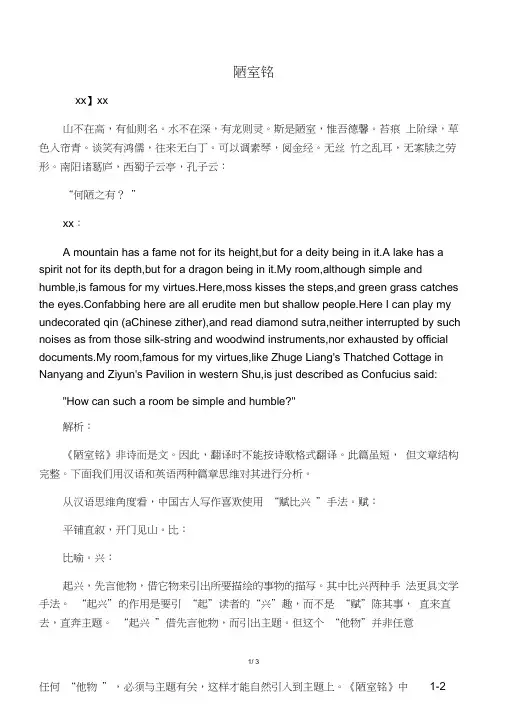
陋室铭xx】xx山不在高,有仙则名。
水不在深,有龙则灵。
斯是陋室,惟吾德馨。
苔痕上阶绿,草色入帘青。
谈笑有鸿儒,往来无白丁。
可以调素琴,阅金经。
无丝竹之乱耳,无案牍之劳形。
南阳诸葛庐,西蜀子云亭,孔子云:“何陋之有?”xx:A mountain has a fame not for its height,but for a deity being in it.A lake has a spirit not for its depth,but for a dragon being in it.My room,although simple and humble,is famous for my virtues.Here,moss kisses the steps,and green grass catches the eyes.Confabbing here are all erudite men but shallow people.Here I can play my undecorated qin (aChinese zither),and read diamond sutra,neither interrupted by such noises as from those silk-string and woodwind instruments,nor exhausted by official documents.My room,famous for my virtues,like Zhuge Liang's Thatched Cottage in Nanyang and Ziyun's Pavilion in western Shu,is just described as Confucius said:"How can such a room be simple and humble?"解析:《陋室铭》非诗而是文。
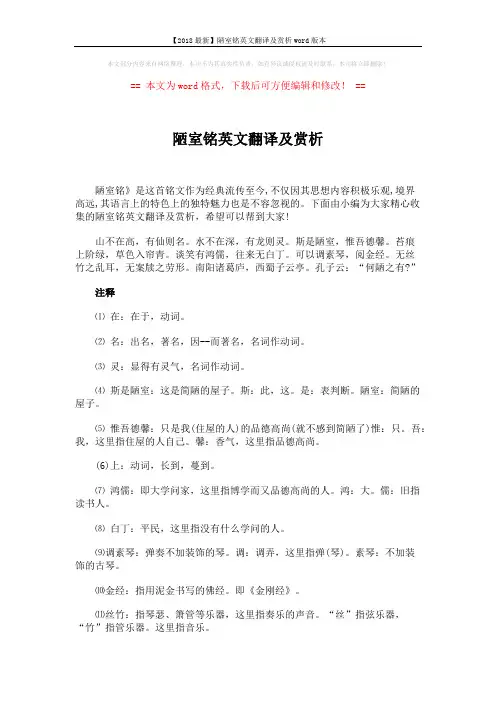
本文部分内容来自网络整理,本司不为其真实性负责,如有异议或侵权请及时联系,本司将立即删除!== 本文为word格式,下载后可方便编辑和修改! ==陋室铭英文翻译及赏析陋室铭》是这首铭文作为经典流传至今,不仅因其思想内容积极乐观,境界高远,其语言上的特色上的独特魅力也是不容忽视的。
下面由小编为大家精心收集的陋室铭英文翻译及赏析,希望可以帮到大家!山不在高,有仙则名。
水不在深,有龙则灵。
斯是陋室,惟吾德馨。
苔痕上阶绿,草色入帘青。
谈笑有鸿儒,往来无白丁。
可以调素琴,阅金经。
无丝竹之乱耳,无案牍之劳形。
南阳诸葛庐,西蜀子云亭。
孔子云:“何陋之有?”注释⑴ 在:在于,动词。
⑵ 名:出名,著名,因--而著名,名词作动词。
⑶ 灵:显得有灵气,名词作动词。
⑷ 斯是陋室:这是简陋的屋子。
斯:此,这。
是:表判断。
陋室:简陋的屋子。
⑸ 惟吾德馨:只是我(住屋的人)的品德高尚(就不感到简陋了)惟:只。
吾:我,这里指住屋的人自己。
馨:香气,这里指品德高尚。
(6)上:动词,长到,蔓到。
⑺ 鸿儒:即大学问家,这里指博学而又品德高尚的人。
鸿:大。
儒:旧指读书人。
⑻ 白丁:平民,这里指没有什么学问的人。
⑼调素琴:弹奏不加装饰的琴。
调:调弄,这里指弹(琴)。
素琴:不加装饰的古琴。
⑽金经:指用泥金书写的佛经。
即《金刚经》。
⑾丝竹:指琴瑟、箫管等乐器,这里指奏乐的声音。
“丝”指弦乐器,“竹”指管乐器。
这里指音乐。
⑿之:助词,不译。
用在主谓间,取消句子的独立性。
⒀乱耳:扰乱双耳。
乱:形容词的使动用法,使……乱,扰乱。
⒁案牍(dú):官府的公文。
⒂劳形:使身体劳累(使动用法)。
劳:形容词的使动用法,使……劳累。
形:形体、身体。
⒃南阳:地名,今河南省南阳市西。
诸葛亮在出山之前,曾在南阳卧龙岗中隐居躬耕。
⒄南阳诸葛庐,西蜀子云亭:南阳有诸葛亮的草庐,西蜀有扬子云的亭子。
这两句是说,诸葛庐和子云亭都很简陋,因为居住的人很有名,所以受到人们的景仰。
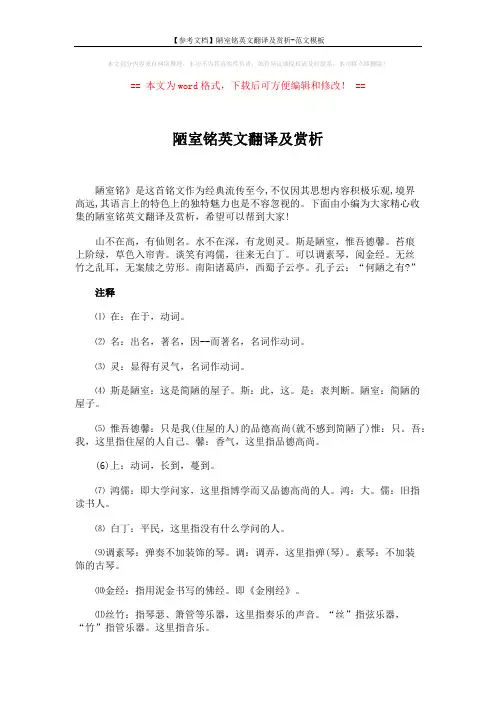
本文部分内容来自网络整理,本司不为其真实性负责,如有异议或侵权请及时联系,本司将立即删除!== 本文为word格式,下载后可方便编辑和修改! ==陋室铭英文翻译及赏析陋室铭》是这首铭文作为经典流传至今,不仅因其思想内容积极乐观,境界高远,其语言上的特色上的独特魅力也是不容忽视的。
下面由小编为大家精心收集的陋室铭英文翻译及赏析,希望可以帮到大家!山不在高,有仙则名。
水不在深,有龙则灵。
斯是陋室,惟吾德馨。
苔痕上阶绿,草色入帘青。
谈笑有鸿儒,往来无白丁。
可以调素琴,阅金经。
无丝竹之乱耳,无案牍之劳形。
南阳诸葛庐,西蜀子云亭。
孔子云:“何陋之有?”注释⑴ 在:在于,动词。
⑵ 名:出名,著名,因--而著名,名词作动词。
⑶ 灵:显得有灵气,名词作动词。
⑷ 斯是陋室:这是简陋的屋子。
斯:此,这。
是:表判断。
陋室:简陋的屋子。
⑸ 惟吾德馨:只是我(住屋的人)的品德高尚(就不感到简陋了)惟:只。
吾:我,这里指住屋的人自己。
馨:香气,这里指品德高尚。
(6)上:动词,长到,蔓到。
⑺ 鸿儒:即大学问家,这里指博学而又品德高尚的人。
鸿:大。
儒:旧指读书人。
⑻ 白丁:平民,这里指没有什么学问的人。
⑼调素琴:弹奏不加装饰的琴。
调:调弄,这里指弹(琴)。
素琴:不加装饰的古琴。
⑽金经:指用泥金书写的佛经。
即《金刚经》。
⑾丝竹:指琴瑟、箫管等乐器,这里指奏乐的声音。
“丝”指弦乐器,“竹”指管乐器。
这里指音乐。
⑿之:助词,不译。
用在主谓间,取消句子的独立性。
⒀乱耳:扰乱双耳。
乱:形容词的使动用法,使……乱,扰乱。
⒁案牍(dú):官府的公文。
⒂劳形:使身体劳累(使动用法)。
劳:形容词的使动用法,使……劳累。
形:形体、身体。
⒃南阳:地名,今河南省南阳市西。
诸葛亮在出山之前,曾在南阳卧龙岗中隐居躬耕。
⒄南阳诸葛庐,西蜀子云亭:南阳有诸葛亮的草庐,西蜀有扬子云的亭子。
这两句是说,诸葛庐和子云亭都很简陋,因为居住的人很有名,所以受到人们的景仰。
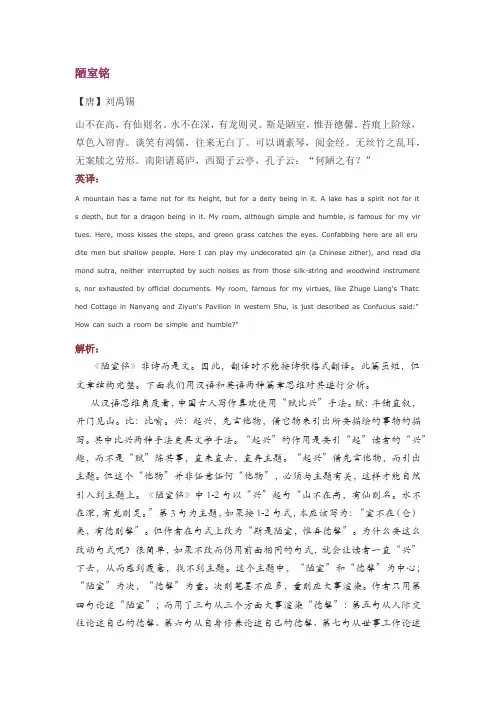
陋室铭【唐】刘禹锡山不在高,有仙则名。
水不在深,有龙则灵。
斯是陋室,惟吾德馨。
苔痕上阶绿,草色入帘青。
谈笑有鸿儒,往来无白丁。
可以调素琴,阅金经。
无丝竹之乱耳,无案牍之劳形。
南阳诸葛庐,西蜀子云亭,孔子云:“何陋之有?”英译:A mountain has a fame not for its height, but for a deity being in it. A lake has a spirit not for its depth, but for a dragon being in it. My room, although simple and humble, is famous for my vir tues. Here, moss kisses the steps, and green grass catches the eyes. Confabbing here are all eru dite men but shallow people. Here I can play my undecorated qin (a Chinese zither), and read dia mond sutra, neither interrupted by such noises as from those silk-string and woodwind instrument s, nor exhausted by official documents. My room, famous for my virtues, like Zhuge Liang's Thatc hed Cottage in Nanyang and Ziyun's Pavilion in western Shu, is just described as Confucius said:" How can such a room be simple and humble?"解析:《陋室铭》非诗而是文。

陋室铭全文解释及译文英文回答:As I read the "Inscription on a Humble Dwelling", I couldn't help but be moved by the profound meaning behind these simple words. This inscription, attributed to the Tang Dynasty poet Liu Yuxi, reflects on the humble and unassuming nature of the poet's dwelling, contrasting it with the grandeur and opulence of the world outside.The inscription begins with the lines "Though my thatched hut is small, it contains the entire universe." This line speaks to the idea that true contentment and fulfillment can be found within oneself, rather than in external possessions or status. It reminds me of the saying "home is where the heart is", emphasizing the importance of inner peace and simplicity.The poet goes on to describe how he finds joy in the simple pleasures of life, such as the sound of the rain onhis roof or the view of the mountains in the distance. He finds beauty in the mundane and the everyday, showing that one does not need extravagant luxuries to find happiness.One of my favorite lines in the inscription is "I mend my clothes among the remnants of the clouds." This image of the poet sewing his clothes amidst the clouds evokes asense of harmony with nature and a connection to the world around him. It reminds me of the importance of beingmindful and present in the moment, finding beauty in the small details of life.Overall, the "Inscription on a Humble Dwelling" is a powerful reminder of the value of simplicity, humility, and gratitude. It encourages us to appreciate the beauty in the ordinary and to find contentment within ourselves, rather than in external wealth or status.中文回答:读完“陋室铭”,我深受这些简单文字背后的深刻含义所感动。
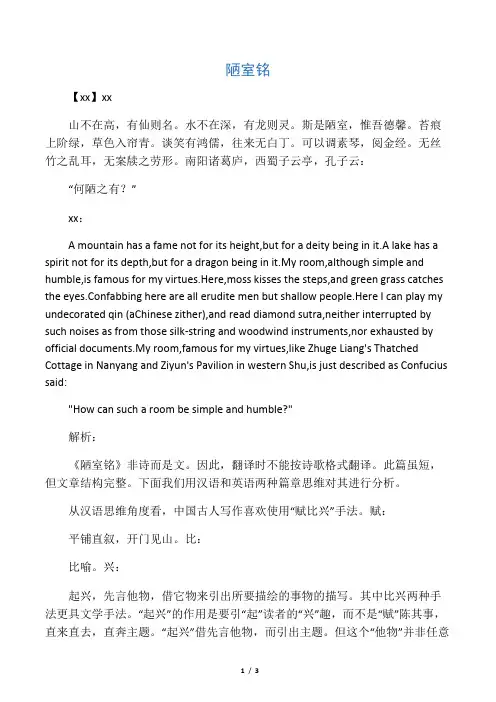
陋室铭【xx】xx山不在高,有仙则名。
水不在深,有龙则灵。
斯是陋室,惟吾德馨。
苔痕上阶绿,草色入帘青。
谈笑有鸿儒,往来无白丁。
可以调素琴,阅金经。
无丝竹之乱耳,无案牍之劳形。
南阳诸葛庐,西蜀子云亭,孔子云:“何陋之有?”xx:A mountain has a fame not for its height,but for a deity being in it.A lake has a spirit not for its depth,but for a dragon being in it.My room,although simple and humble,is famous for my virtues.Here,moss kisses the steps,and green grass catches the eyes.Confabbing here are all erudite men but shallow people.Here I can play my undecorated qin (aChinese zither),and read diamond sutra,neither interrupted by such noises as from those silk-string and woodwind instruments,nor exhausted by official documents.My room,famous for my virtues,like Zhuge Liang's Thatched Cottage in Nanyang and Ziyun's Pavilion in western Shu,is just described as Confucius said:"How can such a room be simple and humble?"解析:《陋室铭》非诗而是文。
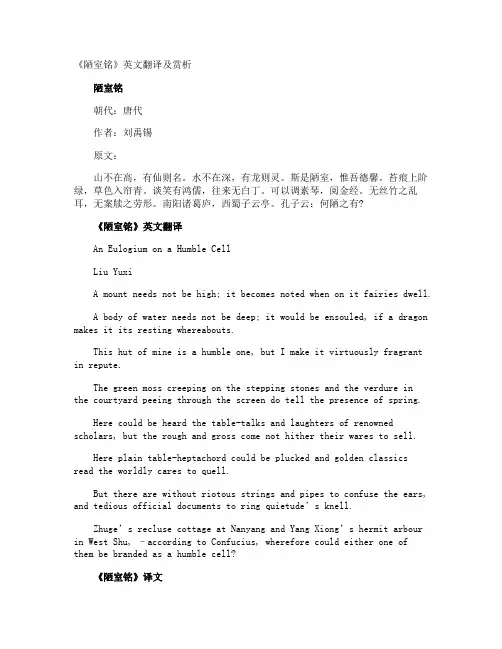
《陋室铭》英文翻译及赏析陋室铭朝代:唐代作者:刘禹锡原文:山不在高,有仙则名。
水不在深,有龙则灵。
斯是陋室,惟吾德馨。
苔痕上阶绿,草色入帘青。
谈笑有鸿儒,往来无白丁。
可以调素琴,阅金经。
无丝竹之乱耳,无案牍之劳形。
南阳诸葛庐,西蜀子云亭。
孔子云:何陋之有?《陋室铭》英文翻译An Eulogium on a Humble CellLiu YuxiA mount needs not be high; it becomes noted when on it fairies dwell.A body of water needs not be deep; it would be ensouled, if a dragon makes it its resting whereabouts.This hut of mine is a humble one, but I make it virtuously fragrantin repute.The green moss creeping on the stepping stones and the verdure inthe courtyard peeing through the screen do tell the presence of spring.Here could be heard the table-talks and laughters of renowned scholars, but the rough and gross come not hither their wares to sell.Here plain table-heptachord could be plucked and golden classicsread the worldly cares to quell.But there are without riotous strings and pipes to confuse the ears, and tedious official documents to ring quietude’s knell.Zhuge’s recluse cottage at Nanyang and Yang Xiong’s hermit arbo ur in West Shu, –according to Confucius, wherefore could either one of them be branded as a humble cell?《陋室铭》译文《陋室铭》注释⑴陋室:简陋的屋子。
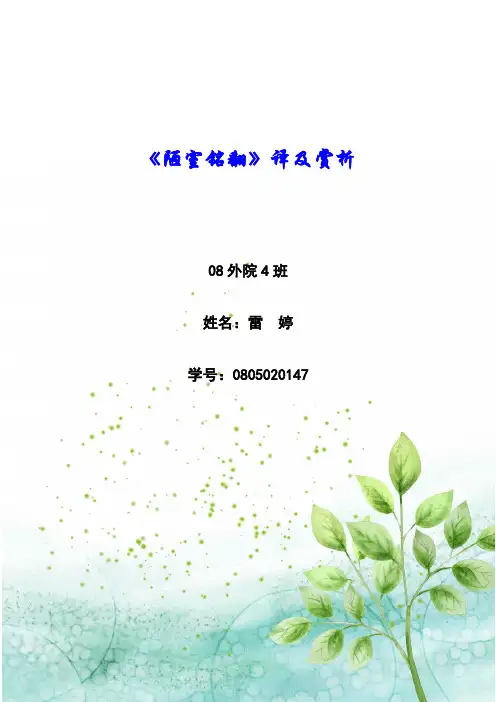
《陋室铭翻》译及赏析08外院4班姓名:雷婷学号:0805020147An Epigraph of My Humble HomeIt doesn't matter how hight the mountain is,It is the celestial being who make it famous.It doesn't matter how deep the lake is,It is the dragon who give it magical power.It doesn't matter how humble my home is,It is my virtues which make it sweet.The moss cover the stonesteps green by creeping,The grass turns the curtain blue by reflecting.I chat happily with learned scholars,But i have no interaction with illiterate persons.In this humble room,I can enjoy playing the undecorated Qin ,Or reading precious Buddhist Scriptures.I can avoid the disturbance of unpleasant music coming into my ear, And get rid of the wearing reading of official documents.My home is just like the thatched cottage of Zhu Geliang in Nanyang, Or the pavilion of Zi Yun in Xishu.As confucius once said :"How could we call it a humble home ?"翻译体会翻译《陋室铭》时,首要任务就是要理解和弄清古文所表达的含义以及作者的主观态度是积极还是消极的。
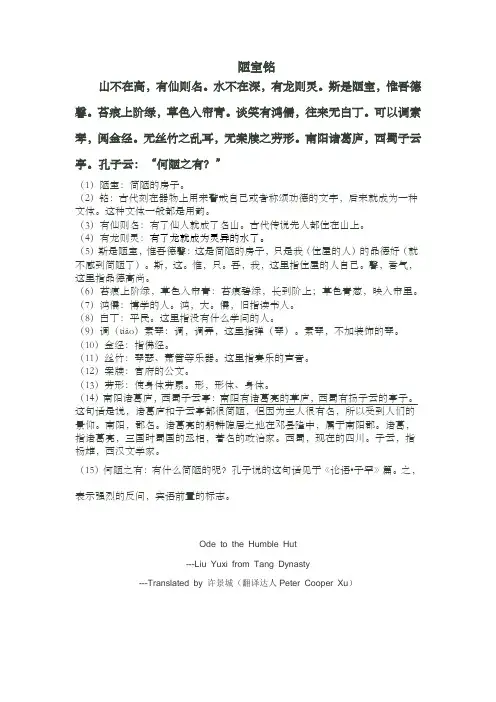
陋室铭山不在高,有仙则名。
水不在深,有龙则灵。
斯是陋室,惟吾德馨。
苔痕上阶绿,草色入帘青。
谈笑有鸿儒,往来无白丁。
可以调素琴,阅金经。
无丝竹之乱耳,无案牍之劳形。
南阳诸葛庐,西蜀子云亭。
孔子云:“何陋之有?”(1)陋室:简陋的房子。
(2)铭:古代刻在器物上用来警戒自己或者称颂功德的文字,后来就成为一种文体。
这种文体一般都是用韵。
(3)有仙则名:有了仙人就成了名山。
古代传说先人都住在山上。
(4)有龙则灵:有了龙就成为灵异的水了。
(5)斯是陋室,惟吾德馨:这是简陋的房子,只是我(住屋的人)的品德好(就不感到简陋了)。
斯,这。
惟,只。
吾,我,这里指住屋的人自己。
馨,香气,这里指品德高尚。
(6)苔痕上阶绿,草色入帘青:苔痕碧绿,长到阶上;草色青葱,映入帘里。
(7)鸿儒:博学的人。
鸿,大。
儒,旧指读书人。
(8)白丁:平民。
这里指没有什么学问的人。
(9)调(tiáo)素琴:调,调弄,这里指弹(琴)。
素琴,不加装饰的琴。
(10)金经:指佛经。
(11)丝竹:琴瑟、萧管等乐器。
这里指奏乐的声音。
(12)案牍:官府的公文。
(13)劳形:使身体劳累。
形,形体、身体。
(14)南阳诸葛庐,西蜀子云亭:南阳有诸葛亮的草庐,西蜀有扬子云的亭子。
这句话是说,诸葛庐和子云亭都很简陋,但因为主人很有名,所以受到人们的景仰。
南阳,郡名。
诸葛亮的躬耕隐居之地在邓县隆中,属于南阳郡。
诸葛,指诸葛亮,三国时蜀国的丞相,著名的政治家。
西蜀,现在的四川。
子云,指杨雄,西汉文学家。
(15)何陋之有:有什么简陋的呢?孔子说的这句话见于《论语•子罕》篇。
之,表示强烈的反问,宾语前置的标志。
Ode to the Humble Hut---Liu Yuxi from Tang Dynasty---Translated by 许景城(翻译达人Peter Cooper Xu)Renowned will be a hill if angles live,Regardless of its being high or low.Ensouled will be a rill if dragons live,In spite of its being deep or shallow.Humble is the hut where I dwell,Yet all shames my virtues dispel.Green are the stonesteps with lichens creeping,Blue is my room through screens from grass shining.Conversing to me are all erudites,Never dropped in by the illiterates.Reading the sutra and playing the lyre,Never are we troubled by noisy string and flute sound;Nor are we fatigued by heavy official files around.There in Nanyang sees Zhuge's thatched hut;There in West Shu stands Yang Xiong's arbor,Just as Confucius said, “Humble’s the hut?”散文版译文:An Inscription to the Humble Hut---Liu Yuxi from Tang Dynasty---Translated by 许景城(翻译达人Peter Cooper Xu)Renowned a mountain is not for its height but for the immortal who lives in it. Ensouled is a sea not for its depth but for the dragon who entrenches in it. It's true of my humble hut where I see my morality, virtues, and happiness but shames. Lichens are creeping up to the stone steps which are coated in green while grasses are shinning through the bamboo portiere of my room where is echoed blue. Coming to my house and conversing to me arethe persons who have great knowledge not illiterates. From time to time, we can play the lyre, or read Buddhist scriptures, never troubled by noisy string and flute sounds or the heavy official documents. Thus, my humble hut is like the thatched shed where Zhuge Liang from Nanyang lived and the thatched pavilion where Yang Ziyun from West Shu Shire dwelled. Just as a saying from Confucius goes like this, "Is it humble?"Notes:1. Liu Yuxi (772-842) was a famous poet and philosopher in Tang Dynasty. He used to bea investigating censor and an active revolutionary. After the failure of Yong Zhen Innovation, he lost his official hat and degraded to serve as an unimportant official in Langzhou (now Changde in Hunan).2. The Ode or Inscription was written by him to express the poet’s attitude towards life and wealth and ranks. He in pursuit of his high moral integrity would rather stay as a hermit in the humble hut than work with toadies in the imperial court.3. Zhuge Liang is the famous statesman and strategist of Shu Kingdom and before he became the prime minister to Liu Bei, the duke of Shu Kingdom, he lived as a recluse in Wolonggang, Nanyang in Henan province.4. Yang Ziyun, whose real name is Yangxiong, is a famous litterateur in West Han Dynasty, and he had a thatched pavilion in Shu Shire now in Sichuan.其他译文:译文1:An Epigraph in Praise of My Humble Home---Liu Yuxi---罗经国译A mountain needn't be high; It is famous so long as there is a deity on it. A lake needn't be deep; It has supernatural power so long as there is a dragon in it. My home is humble, But it enjoys the fame of virtue so long as I am living in it. The moss creeping onto the doorsteps turns them green. The color of the grass reflected through the bamboo curtains turns the room blue. Erudite scholars come in good spirits to talk with me, And among my guests there is no unlearned common man. In this humble room, I can enjoy playing my plainly decorated qin, or read the Buddhist Scriptures quietly, Without the disturbance of the noisy that jar on the ears, or the solemn burden of reading official documents. My humble home is like the thatched hut of Zhuge Liang of Nanyang, or the Pavilion Ziyun of Xishu. Confucius once said: "How could we call a room humble as long as there is a virtuous man in it?"译文2:An Epigraph for My Humble RoomWr. by Liu Yuxi (Tang Dynasty)Tr. by 颜林海A mountain has a fame not for its height, but for a deity being in it. A lake has a spirit not for its depth, but for a dragon being in it. My room, although simple and humble, is famous for my virtues. Here, moss kisses the steps, and green grass catches the eyes. Confabbing here are all erudite men but shallow people. Here I can play my undecorated qin (a Chinese zither), and read diamond sutra, neither interrupted by such noises as from those silk-string and woodwind instruments, nor exhausted by official documents. My room, famous for my virtues, like Zhuge Liang's Thatched Cottage in Nanyang and Ziyun's Pavilion in western Shu, is just described as Confucius said:"How can such a room be simple and humble?"译文3:An Eulogium on a Humble Cell--- Stephen 译A mount needs not be high; it becomes noted when on it fairies dwell. A body of water needs not be deep; it would be ensouled, if a dragon makes it its resting whereabouts. This hut of mine is a humble one, but I make it virtuously fragrant in repute. The green moss creeping on the stepping stones and the verdure in the courtyard peeing through the screen do tell the presence of spring. Here could be heard the table-talks and laughters of renowned scholars, but the rough and gross come not hither their wares to sell. Here plain table-heptachord could be plucked and golden classics read the worldly cares to quell. But there are without riotous strings and pipes to confuse the ears, and tedious official documents to ring quietude's knell. Zhuge's recluse cottage at Nanyang and Yang Xiong's hermit arbour in West Shu, — according to Confucius, wherefore could either one of them be branded as a humble cell?译文4:Inscription For My Shabby Hut---孙大雨译Mountains need not always be high, They're famed if therein fairies abide. Waters need not always be deep, They're hallowed where dragons are spied. This is a simple, mean abode, Only my virtue lends it fragrance. Moss smears a fringe of green upon The stone steps forming the terrace; And peering through the screen, there throbs the emerald of the lush grass. Great scholars drop in casually, And talk and laugh in abandoned ways; While in this cordial company Nonentities have ne'er a place. The ancient zither we might play, Or golden-lettered scriptures peruse. No concert bands our ears confuse, And no official files await Our tackling—to excruciate. To Zhuge's cottage at Nanyang, Or Ziyun's pavilion in Sichuan, mine may well be compared. So, as Confucius once had said, "Howcould it be considered mean?"译文5﹕Eulogy on My Humble Abode---海外逸士英译Known will hills be if fairies dwell, no matter high or low; and charmed will waters be if dragons lurk, no matter deep or shallow. A humble abode though this is, my virtues make it smell sweet. Verdant are the stonesteps overgrown with moss, and green seems the screen as the grass seen through it. I chat and laugh only with great scholars and have no intercourse with the ignorant. I can play simple zither and read Buddhist sutras; no string and bamboo instruments to grate on my ears and no government documents to weary my mortal form. That's what like Zhuge's cottage in Nanyang and Ziyun's pavilion in Xishu as Confucius quoth, "How canth it be humble?"。

英汉译文赏析作业舒卉陋室铭唐·刘禹锡山不在高,有仙则名。
水不在深,有龙则灵。
斯是陋室,惟吾德馨。
苔痕上阶绿,草色入帘青。
谈笑有鸿儒,往来无白丁。
可以调素琴,阅金经。
无丝竹之乱耳,无案牍之劳形。
南阳诸葛庐,西蜀子云亭。
孔子云:“何陋之有?”The Inscription of My Humble Room——Liu Yuxi from Tang DynastyA mountain needn't be so high, just becomes famous as there is a immortal. A lake needn't be so deep, just becomes miraculous as there is a dragon. My room is humble, but becomes fragrant as I am living in it. The moss creeping onto the stairs turns them green. The color of the grass through the curtains turns the room blue. Erudites come in and talk together. And there is no unlearned man. I can enjoy playing my clean qin and reading buddhist scriptures. There is no the disturbance of nosy that disturb the ears and any burden of reading official documents. Neither of Zhuge Liang's Cottage in Nanyang and Yang Ziyun's Pavilion in Xishu are not compared with mine. Confucius said: "Is there any humble?"译文的赏析:我认为陋室铭的这篇英文翻译还是不错的,个人也做了一些修改。
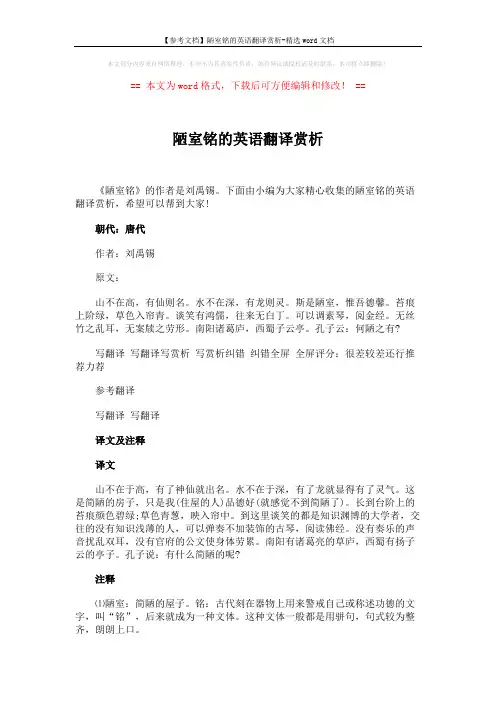
本文部分内容来自网络整理,本司不为其真实性负责,如有异议或侵权请及时联系,本司将立即删除!== 本文为word格式,下载后可方便编辑和修改! ==陋室铭的英语翻译赏析《陋室铭》的作者是刘禹锡。
下面由小编为大家精心收集的陋室铭的英语翻译赏析,希望可以帮到大家!朝代:唐代作者:刘禹锡原文:山不在高,有仙则名。
水不在深,有龙则灵。
斯是陋室,惟吾德馨。
苔痕上阶绿,草色入帘青。
谈笑有鸿儒,往来无白丁。
可以调素琴,阅金经。
无丝竹之乱耳,无案牍之劳形。
南阳诸葛庐,西蜀子云亭。
孔子云:何陋之有?写翻译写翻译写赏析写赏析纠错纠错全屏全屏评分:很差较差还行推荐力荐参考翻译写翻译写翻译译文及注释译文山不在于高,有了神仙就出名。
水不在于深,有了龙就显得有了灵气。
这是简陋的房子,只是我(住屋的人)品德好(就感觉不到简陋了)。
长到台阶上的苔痕颜色碧绿;草色青葱,映入帘中。
到这里谈笑的都是知识渊博的大学者,交往的没有知识浅薄的人,可以弹奏不加装饰的古琴,阅读佛经。
没有奏乐的声音扰乱双耳,没有官府的公文使身体劳累。
南阳有诸葛亮的草庐,西蜀有扬子云的亭子。
孔子说:有什么简陋的呢?注释⑴陋室:简陋的屋子。
铭:古代刻在器物上用来警戒自己或称述功德的文字,叫“铭”,后来就成为一种文体。
这种文体一般都是用骈句,句式较为整齐,朗朗上口。
⑵在(zài):在于,动词。
⑶名(míng):出名,著名,名词用作动词。
⑷灵(líng):名词作动词,显得有灵气。
⑸斯是陋室(lòu shì):这是简陋的屋子。
斯:指示代词,此,这。
是:表肯定的判断动词。
陋室:简陋的屋子,这里指作者自己的屋子。
⑹惟吾德馨(xīn):只因为(陋室铭)的铭文(就不感到简陋了)。
惟:只。
吾:我,这里是指(陋室铭)的铭文。
馨:散布很远的香气,这里指(品德)高尚。
《尚书·君陈》:“黍稷非馨,明德惟馨。
”。
⑺苔痕上阶绿,草色入帘青:苔痕碧绿,长到阶上;草色青葱,映入帘里。
《陋室铭》原文及翻译(实用版)编制人:__________________审核人:__________________审批人:__________________编制单位:__________________编制时间:____年____月____日序言下载提示:该文档是本店铺精心编制而成的,希望大家下载后,能够帮助大家解决实际问题。
文档下载后可定制修改,请根据实际需要进行调整和使用,谢谢!并且,本店铺为大家提供各种类型的实用资料,如试题资料、作文大全、语文资料、公文资料、素材资料、古诗文、教案大全、近义词、反义词、其他资料等等,想了解不同资料格式和写法,敬请关注!Download tips: This document is carefully compiled by this editor.I hope that after you download it, it can help you solve practical problems. The document can be customized and modified after downloading, please adjust and use it according to actual needs, thank you!In addition, this store provides you with various types of practical materials, such as test questions, composition encyclopedia, Chinese materials, official documents, material materials, ancient poetry, teaching plan encyclopedia, synonyms, antonyms, and other materials. If you want to know different data formats and writing methods, please pay attention!《陋室铭》原文及翻译《陋室铭》原文及翻译原文:山不在高,有仙则名。
《陋室铭》英文原文《陋室铭》英文原文(3)斯是陋室,惟吾德馨.这是一间简陋的屋子,只要我(住屋的人)的品德高尚,(就不感到简陋了).(4)苔痕上阶绿,草色入帘青.苔痕碧绿长到台阶上,草色青葱映入帘里.(5)谈笑有鸿儒,往来无白丁.在这里谈笑的都是学识渊博的学者,来来往往的没有学识浅薄的人.(6)可以调素琴,阅金经.可以弹奏不加装饰的古琴,阅览珍贵的`佛经.(7)无丝竹之乱耳,无案牍之劳形.没有嘈杂的管弦乐扰乱着(我的)双耳,没有官府的公文使(我的)身体劳累.(8)南阳诸葛庐,西蜀子云亭.南阳有诸葛亮的草庐,西蜀有杨子云的旧宅.孔子云:“何陋之有?”孔子说:“有什么简陋的呢?”断句山/不在高,有仙/则名.水/不在深,有龙/则灵.斯/是陋室,惟吾/德馨.苔痕/上阶绿,草色/入帘青.谈笑/有鸿儒,往来/无白丁.可以/调素琴,阅/金经.无/丝竹/之乱耳,无/案牍/之劳形.南阳/诸葛庐,西蜀/子云亭.孔子云:“何陋/之有?”本段写作特点最突出的艺术手法的比兴.文章开头运用“山”“水”类比,引出陋室具有名和灵的性质,点明主旨,暗示陋室不陋.(以山水比陋室,以仙龙比德,以名灵比馨)作品主题从主题看,《陋室铭》通过对居室交往人物生活情趣的描绘,极力形容陋室不陋,《陋室铭》一文表现了作者不与世俗同流合污,洁身自好、不追求声色娱乐的生活态度.表达了作者高洁傲岸的情操,流露出作者安贫乐道的隐逸情趣.“铭”是古代刻在器物上用来警戒自己或者称述功德的文字,后来发展成为一种文体,这种文体有用韵的特点. 刘禹锡所作散文简练深刻,自成一家.《陋室铭》是他的一篇传世杰作.从题目看,作者是在赞美陋室,为陋室作铭,其实不然,作者是借物抒情,托物言志.本文运用借物抒情、托物言志,通过对陋室的描写,表达了作者甘居陋室、安贫乐道的思想感情,表现了作者不慕富贵,不与世俗同流合污的高尚节操.立意从立意看,《陋室铭》以衬托手法托物言志.并以反向立意的方式,只字不提陋室之"陋",只写陋室"不陋"的一面,而"不陋"是因为"德行",从而自然地达到了抒怀的目的.表达了作者洁身自好、不慕富贵的节操和安贫乐道的情趣,以及不与世俗同流合污的情感.。
陋室铭---刘禹锡山不在高,有仙则名。
水不在深,有龙则灵。
斯是陋室,惟吾德馨。
苔痕上阶绿,草色入帘青。
谈笑有鸿儒,往来无白丁。
可以调素琴,阅金经。
无丝竹之乱耳,无案牍之劳形。
南阳诸葛庐,西蜀子云亭。
孔子云:何陋之有?翻译:Ode to the Humble Abode--Liu Yuxi It doesn’t matter if a mountain is high,It would be famous if a deity being in there.It doesn’t matter if a lake is deep,It would be charmed if a dragon being in it.My house is humble,But my morality is noble.The overgrown moss turns the stone steps green,The green grass reflects the rooms blue.There are all the great scholars who I talk with.There are not the ignorant who I associate with.I can play my plainly decorated qin gladly.I can read the Buddhist Scripture quietly.No unpleasant music disturbs the peace of my ears.No official documents erodes the health of my body.Just like the thatched cottage of Zhu Geliang in Nanyang ,Or the Pavilion of Ziyun in Xishu.As Confucius quoth, “How could it be humble?”Notes:陋室:简陋的屋子, 在题目中翻译为Humble Abode铭:是古代刻在器物上用来警戒自己或者称述功德的文字,后来成为一种文体。
An Inscription of My Humble CottageLiu YuxiTranslated by江霞A mountain gets fame not for its height,but for its noble fairies.A sea gets anima not for its depth,but for its living beings.My humble cottage achieves honor,despite its shabbiness,for my decent qualities.Emerald moss cover the stonesteps,and green grass color my eyes.I talk with the talented,and associate without the unlearned.Being far from the disturbing noise,I play the plain musical instrument leisurely.Getting rid of the exhausting document,I enjoy the classic Buddhist Scripture carefreely.There stands Zhu Geliang’s famous hut in Nan Yang,and Yang Ziyun’s well-known pavilion in Xi Shu.Considering this,even Confucius wonders,“Why are these humble cottages not humble at all?”The Appreciation of My TranslationGenerally speaking, it is not easy to translate this Chinese classic poem into English. I find the 8th line the most difficult. How to arrange the sentence structure which includes two names of place within one sentence? And how to connect naturally this line with the former lines both in meaning and in form? I think and think, write and write, correct and correct,and finally, it is set down in plain English.( There stands Zhu Geliang’s famous hut in Nan Yang, and Yang Ziyun’s well-known pavilion in Xi Shu.)As to other lines, they turn out to be just several sentences. Or, maybe I can say that they just possess the form of a poem, but lack the lingering charm. If I regard them as sentences, they are beautiful, but when they are combined together to form a poem, their external beauty is not enough.Anyway, in my translation, there are still several words and sentences that I am satisfied with. Such as the parallel structure,the couplet lines,the rhetorical device I have used and the rhyme..The first 3 lines,especially the first 2 lines, are parallel structures. “get...not for...but for...” is in accordance with the original version “不在...有...则...”. At first,I used “is famous” instead of “get fame”, then considering that “get” is more active than “is”, so I adopted “get” at last. A sea gets anima because of the creature living in it, the “龙” may refer to the creature in the water, so I choose “living beings” to replace “dragon”.In the 3rd line, I make a little change in words(using “achieve” rather than “get”) and in sentence structure to avoid prolixity. (A mountain gets fame not for its height, but for its noble fairies. A sea gets anima not for its depth, but for its living beings. My humble cottage achieves honor,despite its shabbiness, for my decent qualities.)I like the 4th and 5th lines best. They are couplet lines which are loyal to the original version and are full of rhetorical devices. Such as the alliteration used in “cover”and “color”; the consonance used in “moss”and “grass”,”steps”and “eyes”,”talented”and “unlearned”; and the antithesis in “with” and “without”, “talented” and “unlearned”. Many people explain “帘” as “竹帘”, while I think it refers to “眼帘”. The moss cover the stonesteps like a green carpet, and similarly, the green of the grass maps into the eyes, like painting our eyes with green color. I think this explanation is also reasonable.( Emerald moss cover the stonesteps, and green grass color my eyes. I talk with the talented, and associate without the unlearned.)I mix together the 6th line and the 7th line when I translate as”无丝竹之乱耳,可以调素琴;无案牍之劳形,可以阅金经”, because these two lines are related to each other closely, and are something like reasons and results, which need to be mixed together. Again,these two lines are translated into parallel structure, started with two present participle phrases and ended with two adverbs.At first, my version of these two lines was, “Not being disturbed by the noisy sound,I...Not being exhausted by the secular document,I...”, then I thought it was strange to purposely make the structure the same, so I changed a little. Besides, the word “noise”is not suitable enough to express“丝竹之音”, and “document” is too modern to express “案牍”.( Being far from the disturbing noise, I play the plain musical instrument leisurely. Getting rid of the exhausting document, I enjoy the classic Buddhist Scripture carefreely.)I interpret the last line “何陋之有?” as “何不陋?”. By doing so, I think it is easier to arouse readers’ resonance, and it is natural for us to think back to the 3rd line. “Why are these humble cottages not humble at all?” That is “for my decent qualities”.( Considering this,even Confucius wonders, “Why are these humble cottages not humble at all?”)At last, I’d like to say something about the title “An Inscription of My Humble Cottage”. I did not change many times for the title,because I feel “inscription” and “humble cottage” are ok for “铭” and “陋室”.An Epigraph in Praise of My Humble HomeLiu YuxiTranslated by罗经国A mountain needn't be high;It is famous so long as there is a deity on it.A lake needn't be deep;It has supernatural power so long as there is a dragon in it.My home is humble,But it enjoys the fame of virtue so long as I am living in it.The moss creeping onto the doorsteps turns them green.The color of the grass reflected through the bamboo curtains turns the room blue.Erudite scholars come in good spirits to talk with me,And among my guests there is no unlearned common man.In this humble room, I can enjoy playing my plainly decorated qin, or read the Buddhist Scripturesquietly,Without the disturbance of the noisy that jar on the ears, or the solemn burden of reading officialdocuments.My humble home is like the thatched hut of Zhuge Liang of Nanyang, or the Pavilion Ziyun ofXishu.Confucius once said: "How could we call a room humble as long as there is a virtuous man in it?"A Brief Comparison Between My Translation and Professor Luo’sAfter comparing my translation with this work translated by Professor Luo, I find that the words and expressions I use are too easy to convey the deep meanings of this poem. The most impressive line is the 8th line—“My humble home is like the thatched hut of Zhuge Liang of Nanyang, or the Pavilion Ziyun of Xishu.” Professor Luo adds some words(My humble home is like) to make this line closely and naturally related to the former lines, it’s amazing!The first 3 lines, Professor Luo also applies parallelism, but his structures are more beautiful and his words are more accurate. Such as“needn't” “deity”“supernatural power” and “so long as”.The 4th line is written under the imagination of Professor Luo, so that it is alive and picturesque. Readers can easily think of such picture in which there are stonesteps covered by green moss, and the green of the grass reflecting on the bamboo curtains colors the room..While my version lacks such imagination.The 5th line, I think, is not so perfect. Though Professor Luo conveys the exact meaning, its language is plain and its form is not ordered beautifully. And the 6th and 7th lines adopt more accurate words than mine. “plainly decorated qin”is more specific than “plain musical instrument”, and I do not translate out the meaning of “jar on the ears”.The last line is closer to the original meaning than mine, while I think my understanding of the last line is also admissible.In a word, my version of translation lacks internal charm. The words and sentences are not elaborate enough to fully express the meaning. Since it is my first time to translate a Chinese classic poem, there are really lots of shortcomings which need to be improved.08级外院3班江霞0805020131周三下午第二大节课附:网上另一翻译版本山不在高,有仙则名。
陋室铭600字作文## 英文回答, ##。
Introduction:The "Loushiming" (Humble Abode Inscription) is a renowned masterpiece by the renowned Chinese poet Liu Yuxi. Composed during the Tang Dynasty, this inscription is a captivating reflection on the contentment one can find in simplicity and self-sufficiency.Analysis of the Inscription:The inscription begins with an evocative description of the poet's humble dwelling: "Empty rooms, free of dust; window open, bright with moon." These lines evoke a serene and uncluttered abode, devoid of material possessions but filled with a sense of spaciousness and tranquility.Liu Yuxi goes on to articulate the virtues of hishumble abode: "Though poor, it's my own; though small, it's my solace." The poet emphasizes the contentment he finds in his modest surroundings, valuing the peace and independence it affords him.However, the inscription is not merely a celebration of material simplicity. Liu Yuxi also extols the intellectual and spiritual freedom that his humble abode enables: "No red tape to bind me; no rich or noble to flatter." By avoiding the constraints of social hierarchies and material obligations, the poet creates a space for contemplation and self-cultivation.The inscription culminates in a powerful affirmation of the poet's values: "Rich and honored may laugh at me, but I will not exchange my peace for their riches." Despite the potential for mockery, Liu Yuxi remains steadfast in his belief that true contentment lies not in material wealth but in the cultivation of inner peace and self-reliance.Conclusion:The "Loushiming" is a timeless reminder of the importance of embracing simplicity, self-sufficiency, and inner contentment. By discarding material possessions and social obligations, Liu Yuxi creates a space for self-reflection and the cultivation of virtues that transcend material wealth.## 中文回答, ##。
Inscription of My Shack
①A hill can get a great fame with an immortal living in it, despite of its height; a lake can gain a good reputation with a dragon lurking in it, despite of its depth. ②Although it is just a shack, one would not be aware of its simplicity because of my noble character. ③Green moss grows onto my stone steps, the verdant color of grass leaps into my door. ④All of the men chatting and laughing here are of wide erudition, none of the men contacting with me are of little learning. ⑤In my shack, I can play my undecorated Guqin (a seven-stringed plucked instrument), I can also read my treasured books. ⑥No mundane music would disturb my ears; no official documents would exhaust me (my body). ⑦This shack is similar to both Zhuge Liang’s thatched cottage in Nan Yan and Yang Ziyun’s pavilion in Xi Shu. ⑧Just like what Confucius said, ‘with a gentlemen living in it, how can one call it simple?’
在做这篇翻译的时候,我用到的句子都比较对称,因为我注意到原文的句子有对称的特点。
我认为以我自己的水平难以翻出原文的古典美,所以索性就用比较通俗浅显的词语来尽量表达出我对原文的理解,有些词的翻译也只是从网络或字典上查找到的,难免会有用词不恰当的地方。
标题《陋室铭》的翻译,主要考虑两点,一是陋室,二是铭。
选用shack作为陋室的翻译原因有二:1.shack的英文解释——a small building that has not been built very well与我对“陋室”的理解比较吻合,陋室就是简陋的屋子,虽然简陋但是其功能是完整的。
2.shack 是单音节词,短小简洁,和古文言简意赅的风格是相符的。
“铭”最初是刻在器物,碑碣上的文字,后来逐步形成一种文体。
表示“铭刻”意思的动词有inscribe和engrave,但是这里要用名词形式,所以选用了inscription(铭文),engraving虽然是名词形式,但是意思是雕刻术或雕版印刷品等与雕刻有关的意思。
第一句翻译关键在于“名”和“灵”的翻译,我认为这两个字都是名词动用,所以在翻译中用了两个动词短语。
“名”和“灵”的意思也是相近的,都是获得美好的名声或变得有名气的意思,所以翻译的时候选用了fame和reputation两个词。
第二句在翻译中,最初选用tatt ie ness,也就是tatty的名词来翻译“简陋”,后来才察觉tatty显得非常不正式,所以改用了simple的名词形式simplicity。
我认为陋室是简洁朴素的,所以用simplicity很合适。
第四句翻译中,“鸿儒”和“白丁”是一对反义词,因为不知如何表达这两个词,所以将原文里的名词在翻译中用表语的形式表现出来,并用all与none和wide与little来形成反差。
第五句翻译中,“素琴”的翻译我选用的是undecorated Guqin,“素”就是质朴的,没有过多装饰的意思,所以我用了undecorated,而“琴”选用“古琴”的汉语拼音是因为我认为古琴是中国传统文化中独有的一种乐器,英语中没有词能与之对应,所以就用了Guqin,并在后面的括号里简要的解释古琴是什么。
对于“金经”的理解有两种,一种是经文,一种是典藏的书籍。
根据以往的学习和对刘禹锡的了解,他对经文似乎没什么研究,所以我选用第二种释义,即典藏的书籍。
Treasure作为名词有“珍宝,珍品”的意思,作为动词有“珍藏”的意思,可以准确的表现出作者刘禹锡热爱书籍的情感。
第七句之所以这样翻译,是因为我对与原文的理解是这样的:作者想要将他的陋室与诸葛亮的茅庐和扬子云的旧居媲美,三者之间必然有相似之处。
最后一句的翻译与第一句的翻译想呼应,都用到了with短语表示伴随,起修饰作用。